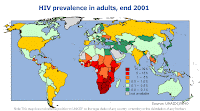Says results remain largely unsatisfactory despite a colossal 720 billion FCFA disbursed to 30 countries since 2000
The fight against the HIV/AIDS pandemic in sub-Saharan Africa remains largely unsatisfactory despite enormous funds made available for the purpose since 2000, says a World Bank report.
The report that was published on the institution’s web site just before the recently held 17th international conference on AIDS which took place in Mexico, states that recent studies have revealed "new and profound realities in HIV/AIDS epidemiology and puts to question some generally accepted opinions and clichés about the disease".
Because of these epidemiological changes, the report further says, there is the need to reformulate the strategies and to prioritize the debate on policies for prevention rather than treatment if efforts at combating the pandemic must not be compromised.
The report also calls for a more efficient use of available funds by beneficiary countries especially those in Africa, south of the Sahara.
To the World Bank the image and opinion held of the disease as associated with poverty is untrue. "HIV/AIDS in African is associated with poverty. But at an individual level it is linked with lifestyle and characteristics known to persons with high revenue: Many simultaneous sex partners, more geographic mobility and urbanization…" the report agues.
Furthermore, the World Bank sounded very disappointed with the results produced by some 30 sub-Saharan African countries that have shared a whopping sum of over 720 billion FCFA since 2000 for the fight against HIV/AIDS whose devastating effects cannot easily be underestimated.
"The rate of infection still supercedes the rate of treatment. One counts five new infections for every two [that are able to afford] treatment," noted the report.
And with treatment being more costly than prevention, experts have recommended that policies for prevention should be encouraged especially in countries like Cameroon where only about 12 percent of infected persons have access to treatment with anti-retrovirals (ARVs).
The bank estimates that treatment for life per patient will cost 2.5 million FCFA while prevention per person will be less than 900,000 FCFA.




No comments:
Post a Comment